
Too Late Blues Blu-ray Review
 John Cassavettes was a director known for his experimental drama films. His first was the independently made Shadows (1959), pretty much a talking heads film. It is a rather dull affair and very much an actor’s film made with friends and as he, as the artiste wanted to make the film. His second, Too Late Blues was made in 1961 for Paramount Pictures. As film historian David Cairns states on the sole extra on the disc, this was a film both directed and produced by Cassavettes meaning that he was working under the instructions of a major film company, Paramount and had to keep within budget as the producer, yet still make the film as he saw fit and as such was battling against himself. Like most of his films this is a very talky film but one filled with lots of atmosphere.
John Cassavettes was a director known for his experimental drama films. His first was the independently made Shadows (1959), pretty much a talking heads film. It is a rather dull affair and very much an actor’s film made with friends and as he, as the artiste wanted to make the film. His second, Too Late Blues was made in 1961 for Paramount Pictures. As film historian David Cairns states on the sole extra on the disc, this was a film both directed and produced by Cassavettes meaning that he was working under the instructions of a major film company, Paramount and had to keep within budget as the producer, yet still make the film as he saw fit and as such was battling against himself. Like most of his films this is a very talky film but one filled with lots of atmosphere.
The story focuses on a small time jazz band playing in sweaty and smoky bars, clubs and pool halls. The band has a manager who gets them into a recording studio as they are on the verge of hitting the big time. This creates conflict amongst the members of the group who are afraid of selling out. The artiste in Cassavettes fears that he too as a filmmaker making a film for a major studio is also selling out. One of the members of the group, known as The Ghost (played by 60s crooner Bobby Darin) is a troubled and coflicted man with some clear issues who has just started dating the beautiful, bright but equally troubled Jess (Stella Stevens). She herself wants to become a jazz singer but is cruelly dissuaded by the groups toady manager, Benny Flowers – a great name for this character. This leads to further conflict within the band with the thoughts of selling out getting in the way of the relationships between all the protagonists.
Undoubtedly Too Late Blues is a smaller film and perhaps not the most representative choice for a Cassavettes choice on the Masters of Cinema Eureka! label; a label that if nothing else always releases films ripe for re-discovery if not discovery. Arguably the best films by the director were A Woman under the Influence (1974) and the much maligned Killing of a Chinese Bookie (1976) but this is certainly an interesting film if not a great one. One aspect that is well worth viewing is the atmospheric black and white photography of Hollywood veteran Lionel Lindon that brings out the beauty of Stevens’ Jess in close-up and the smoky details of the clubs, bars and pool halls.
In the early 60s jazz was a popular and intellectual musical genre with Cassavettes perfectly capturing the cool-cat image of the music. Added to this is an underrated performance, and not one given much credit previously by Bobby Darin. Darin himself had a very troubled life and that comes across well in his none too sympathetic performance as The Ghost. His character treats Jess terribly and gets what he deserves but Darin’s face, not exactly the one of a gigolo as his character clearly sees himself captures the troubled anxiety of the real life Darin.
The transfer is as usual perfect from Eureka! with the only extra being a quarter hour talk about the film from David Cairns. What would have been nice would have been a context setting documentary about the cult jazz scene that swept places such as San Francisco, New York’s Greenwich Village and London in the late 50s/early 60s in what was a well-documented period.
Chris Hick
